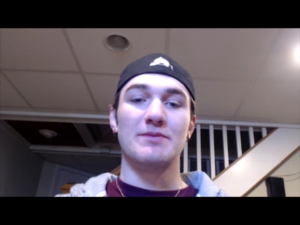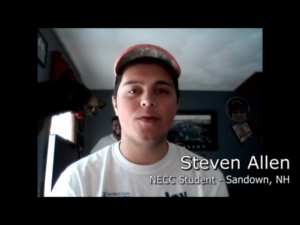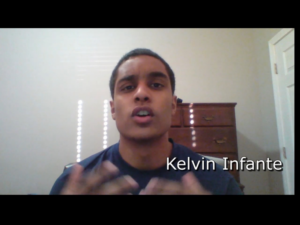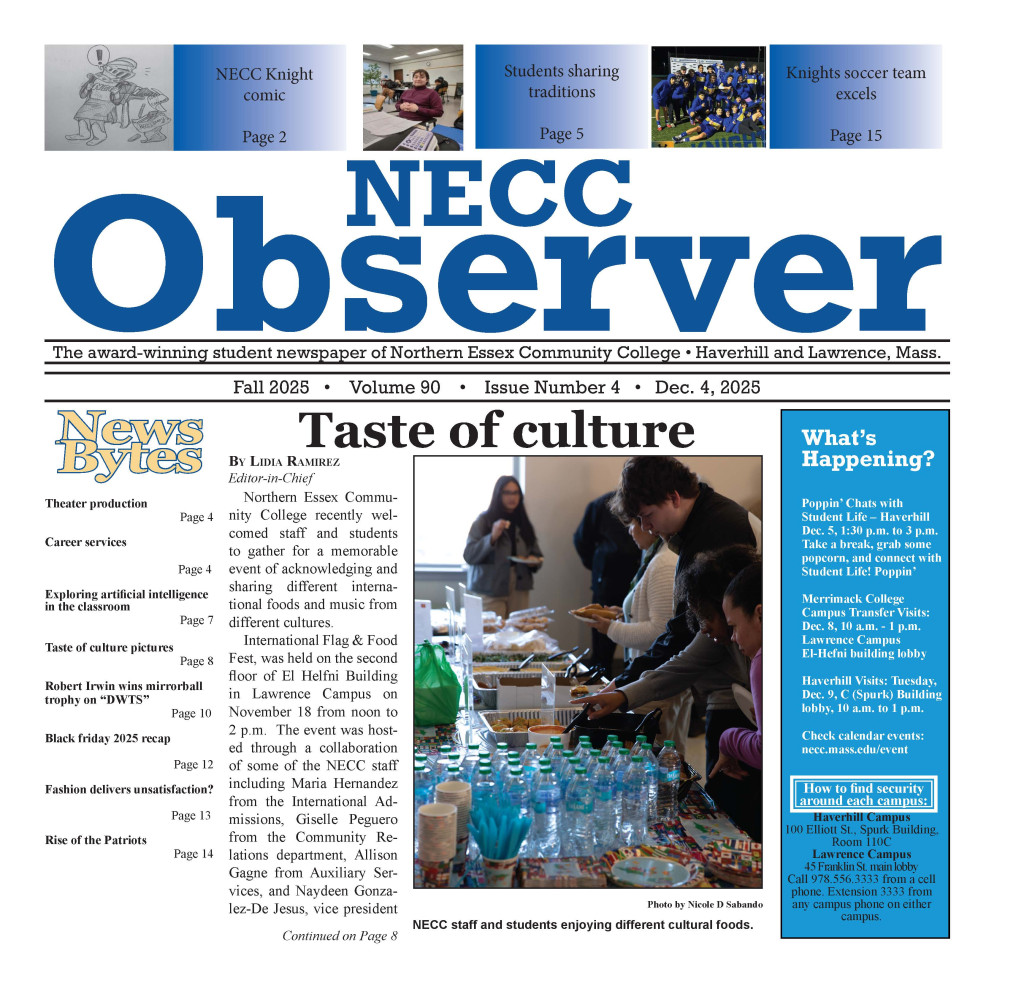
Northern Essex Community College students hosted an online public speaking event, called Speechapalooza, on Instagram, Facebook and Youtube from Wednesday-Friday, April 29-May 1. (Pictured is Dylan Musgrave participating in the event.)
The event helped collect donations for the college’s Student Emergency Fund and was attended by hundreds. The fund provides laptop and/or internet access, tuition assistance and stipends for students dealing with food insecurity, the costs of remote learning, as well as other needs connected to the COVID-19 pandemic. As of Tuesday, the fund had raised at least $15,099, according to the NECC Institution for Advancement.
This year brought the sixth annual iteration of Speechapalooza, the first ever to be held online. It is organized and presented by students in the Principles of Public Relations course taught by David Rattigan this semester.
The show is split up into three episodes that were released over a three day period.
Throughout its production, the event gained press attention all across MA; it was picked up by reputable, widely read outlets like the Eagle Tribune and Merrimack Valley Magazine. Speechapalooza was promoted by the NECC Newsroom, the college’s official communications division, the NECC Observer and the Lowell Association for the Blind.
Former Executive Planning Committee Co-Chair Amari Butler of Methuen is a member of the LAB. She says, “Being one of the co-chairs of Speechapalooza has taught me to be more of a leader. It has given me more confidence despite my disability.”
The Executive Planning Committee coordinated the entire event and wrote and disseminated the press releases which were run in the aforementioned outlets. The committee was entirely student-run.
“Especially in a challenging time like this, we want to give students an opportunity to voice their concerns and opinions,” says Jasmine Sanchez of Haverhill, another former co-chair of the Executive Planning Committee. “We don’t often get to hear what students want to say, so adapting rather than cancelling the event is a no-brainer.”
After stay-at-home orders and school closures were effected by MA Gov. Charlie Baker about halfway into their semester, students of NECC’s Principles of Public Relations class converted Speechapalooza into an online event so that student speakers could be celebrated in spite of COVID-19 and so that money could be raised for fellow students in some way affected by the pandemic.
Students were gathered from the numerous public speaking classes and asked to record themselves delivering a speech at home. Nine willing students were featured in the event. Student speeches exhibited a wide range of subjects, with one student’s speech constituting an examination of the nuances of biomedical engineering and another’s presentation recounting a personal story of beating drug addiction.
John DiBurro of Haverhill, a student of Principles of PR, proudly states, “Our team worked incredibly hard to make this event happen. Through our efforts, we achieved a greater audience than anticipated and raised a substantial amount of money for those in need.”
“Our lineup was a wonderful reflection of the students who come to our school,” says Andrew Venditti of Haverhill, an Executive Planning Committee co-chair.
The Executive Planning Committee consisted of Butler, Venditti, Sanchez, Jessica Kramer of Haverhill and Jonas Ruzek of Amesbury.
Wednesday’s episode was co-hosted by Alyse Festa of North Andover and Cole St. Jean of Plasitow, NH, Thursday’s episode was hosted by Trey Cruz of Lawrence and Friday’s episode was hosted by Dylan Musgrave of Plaistow. Cruz says, “The tenacity with which our PR students pursued this event shows a lot about how hard-working NECC communications students are.”
Other students involved in coordinating the event included William Tapley of Sandown, NH, DiBurro, Rachel Anderson of Haverhill, Evan O’Connell of Reading, Julia Matos of Groveland, Dilenia Martinez of Lawrence, Finbarr Arsenault of Amesbury and Katherine Townsend of Merrimac.
In Speechapalooza’s first online-only event different challenges arose. Speaking at home is much different than in front of an audience according to the host of episode two, Cruz.
“There’s a certain energy exchange that was lost in having to take this to the web. It doesn’t feel natural speaking to a laptop camera. I think hosting is largely about interacting with the audience, and when deprived of a direct, visible audience, my role did feel a bit superfluous,” he said.
Venditti had this to say of the event: “Easily the biggest challenge in organizing this online was coordinating. Sometimes, emails make it easier to reach someone, but trying to get a large group of people to work on the same project with little face to face communication was a challenge and a half.”
Though Venditti did have a positive outlook on the online version of the event.
“Despite the coronavirus situation, I think Speechapalooza did pretty well for it’s first time being held online… It’s especially rewarding because that helped spread awareness of the school’s emergency fund, and plenty of students could use some help right now.”
“I think hosting Speechapalooza online was a success, and it made it much easier for people to see the event,” said Musgrave.
According to Youtube statistics, Speechapalooza attracted over 400 views over the three episode event. The videos can be accessed from the Speechapalooza social media accounts and can be found on youtube for years to come.
To view the three episodes visit the Speechapalooza YouTube page.



